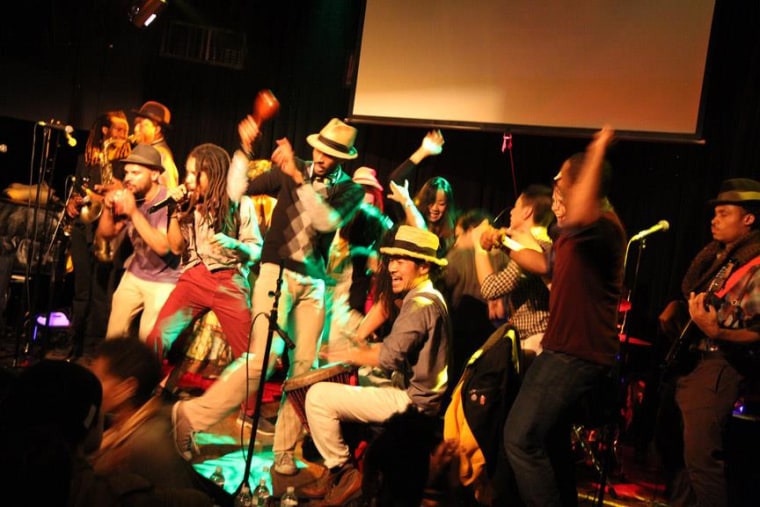Back in 2001 and fresh from Shizuoka, a city near Japan’s picturesque Mt. Fuji, Yuichi Iida found himself standing in Manhattan’s Union Square, transfixed on a Rastafarian banging an African drum. The 20-year-old City College music student, sporting a head of dreadlocks, was hoping the percussionist, Jeremiah McFarlane, might teach him how to play.
Shy at first, Iida bought one of McFarlane’s CDs and listened to it over and over. Soon after, through a mutual friend’s introduction, he worked up the courage to ask McFarlane for lessons.
“He told me he wouldn’t take money,” recalled Iida, who lives with his wife and two children in Park Slope, Brooklyn. “But he said I could sit next to him and watch.”
So Iida watched and learned. That introduction into New York’s Rasta scene planted the seed for him and Joe Jang, a college classmate, to launch a world-roots band called Brown Rice Family, whose message of global solidarity, natural living and world peace has attracted a diverse base of fans, including many from Japan, since its founding in 2006.
To be sure, Jamaican culture had been a part of Iida’s life long before he moved to America. Iida, 33, recalls fellow Japanese attending an annual festival in Shizuoka devoted to roots reggae, a music genre popularized by legendary Jamaican singer and Rastafarian Bob Marley, who visited Japan in 1979.
“It’s all about giving good vibrations to the people, giving them inspiration."
Each year, Iida added, the townsfolk also celebrated the birthday of Haile Selassie, who reigned as Ethiopia’s emperor from 1930 to 1974 and is revered as the Rastafarian messiah.
Over time, the music and Rasta message struck a chord with Iida, who began learning to play the Taiko, a traditional Japanese drum, at age six.
“It’s all about giving good vibrations to the people, giving them inspiration,” he said.

Iida, whose English is tinged with a melodic Jamaican lilt, immersed himself in Rasta culture after moving to New York 14 years ago to study sonic arts, a major that focuses on the production side of music.
There, he forged a friendship with McFarlane, who not only taught him to play the djembe, an African drum, but also introduced him to the tenets of Rasta cuisine, a diet that emphasizes natural and pure foods. That, Iida says, is when he discovered something about brown rice.
“It’s the perfect food, complete in nutrition,” he explained. “It’s the perfect living food.”
Hoping to infuse the essence of this “perfect food” into their music, Iida and former co-founder Jang, who left six years ago, named their nine-member band Brown Rice Family, attracting musicians from as far away as South Africa, Jamaica and Japan. Further extending its message of healthy living, the band also began making and selling its own soap, using green tea from Iida’s hometown as a key ingredient.
Kazuya Ishijima, a Japanese guitarist who has been with the band for seven years, said he was living in Spanish Harlem when he first learned of the group. Growing up in Saitama, a city near Tokyo, Ishijima said he dreamed of someday performing with a band comprised of different ethnicities and cultures.
Brown Rice Family gave him that chance.
“When I joined, my dream had come true,” said Ishijima, 34, pausing to shake hands with fans, many of them Japanese, as they left a December 13 show in Manhattan’s Alphabet City.

Ishijima, who wears ropy dreadlocks down to his waist and hasn’t cut his hair in 11 years, said he hesitates to call himself a Rastafarian because he “respects the culture.” And while the group has an undeniable Rasta influence, Brown Rice Family’s music is neither Rastafarian nor Reggae, he said, but rather a hybrid of many genres, including hip-hop, funk, Brazilian and jazz.
For some Japanese who attended Brown Rice Family’s performance Saturday, the band’s message about encouraging cooperation among nations and spreading peace through music is especially relevant today.
Following Japanese Prime Minister Shinzo Abe’s reelection December 14, some in Japan are concerned about the conservative leader’s plans to strengthen the island nation’s military. Japan’s constitution, written in 1947 by occupying Allied forces two years after the end of World War II, expressly forbids the formation of a traditional military, except for self-defense.
"Their music could change Japanese and the way they think about war.”
Tomoko Okamoto, 37, who happened to be in Japan to see Brown Rice Family play for the first time in Tokyo and Osaka this past summer, said the band’s vibe is a positive one for Japanese society.
“We don’t go to war,” she said. “That’s how we grew up. And right now the government is trying to change that. Their music could change Japanese and the way they think about war.”
Iida echoed Okamoto’s sentiment, saying that he also views his band’s music as a means to bridge historical rifts with Korea, a former Japanese colony, as well as China, parts of which Japan occupied during colonial rule.
“We have a bad history, one that we cannot forget or ignore,” he said. “But we have to move forward in a positive way.”

